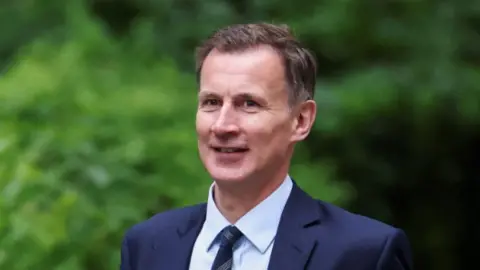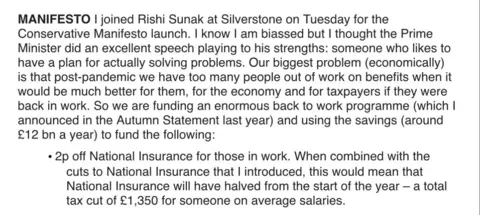13 minutes ago
By Henry Zeffman, @hzeffman,
Chief Political Correspondent

 Reuters
Reuters
Labour has accused the Conservatives of proposing unfunded tax cuts after Jeremy Hunt suggested key manifesto promises on welfare cuts had already been announced.
The Conservative manifesto is funded in large part by proposed cuts to spending on benefits, which the party says are not currently government policy.
But the chancellor wrote in a newsletter to constituents last week that the tax cuts in the Conservative manifesto would be funded by savings from "an enormous back to work programme (which I announced in the Autumn Statement last year)".
Labour seized on his comments as evidence that the welfare cuts “are not new” and “the money has been spent”.
The Conservatives said Labour were in “complete denial” about the rise in the benefits bill and insisted that the savings they intend to use to fund tax cuts will come from new policies.
Government spending on health and disability-related benefits has risen by £20bn in real terms since 2019, and a further £11bn increase is forecast over the next five years, making this a significant policy challenge for whichever party wins the general election.
It is especially crucial for the Conservative Party because they have said they would cut £12bn a year in government spending on benefits compared to forecast levels by 2029.
Those savings make up around two-thirds of the money being used to fund manifesto pledges on tax cuts and increased defence spending.
But if the policies are already factored into government plans, as Labour claim, then the savings would be much smaller and unable to fund tax cuts.
Mr Hunt, who has acknowledged he faces a tough battle to win his constituency of Godalming and Ash on 4 July, writes a newsletter for constituents twice a week.
At the start of the campaign he told recipients: “I write them myself so what you read will be my own views."


Mr Hunt writes a regular newsletter for constituents
In an edition on Thursday, two days after Rishi Sunak had launched the Conservative manifesto, the chancellor wrote: “Our biggest problem (economically) is that post-pandemic we have too many people out of work on benefits when it would be much better for them, for the economy and for taxpayers if they were back in work.
“So we are funding an enormous back to work programme (which I announced in the Autumn Statement last year)."
He continued that if the Conservatives won the election they would be “using the savings” to fund a 2p cut to national insurance for workers and the abolition of national insurance for the self-employed, the flagship measures in Mr Sunak’s manifesto.
Labour argue that this passage is effectively an admission from Mr Hunt that parts of the Conservatives’ plans are already government policy, meaning that they have already been factored into government budgets and spending plans.
They say this means that the savings will be lower than £12bn and that as a result the tax cuts are “unfunded”.
Darren Jones, the shadow chief secretary to the Treasury, said: “This private admission from Jeremy Hunt that the Conservatives’ welfare cuts are not new, the money has been spent, and their plans are therefore unfunded drives a coach and horses through his party’s manifesto, which is no longer worth the paper it is written on.
“Rishi Sunak lied about Labour’s plans and we now have the evidence he is lying about his own - from his Chancellor.
"It’s time Sunak 'fessed up and admitted his manifesto is a desperate wish list of unfunded promises that risks crashing the economy”.
The Conservatives insist their measures to reduce welfare spending have been announced since Mr Hunt’s autumn statement, which was in November last year, or will be announced in the future.
Their claims about welfare savings have also been questioned by the independent Institute for Fiscal Studies (IFS) think tank, who said that it was “far from clear” that the they could save the required amount.
The IFS said that was because “many of the policies that they plan to set out in their manifesto were previously announced by the government and have therefore already been incorporated” into government budgets.
Much of the Conservatives’ drive for savings from the welfare bill would come from halting the surge in claims for disability benefits, primarily the Personal Independence Payment (PIP).
The number of claimants has risen from 2.3 million people in 2019 to 3.6 million now and is forecast to rise to 4.6 million within five years of the election.
The government launched a consultation on ways to reform PIP in April.
Paul Johnson, the IFS’s director, has said that the cuts in spending required by the Conservatives’ plans “would not be easy and would need definite, clear policies that require difficult decisions” and have not yet been announced.
However, he added: “I was equally sceptical about promises of delivering £12bn of welfare savings in the 2015 manifesto.
"Via some serious cuts, including four years of freezes, those savings were broadly delivered, albeit two years later than that manifesto had claimed."
A Conservative spokesman said: “Unless action is taken, the working-age welfare bill will rise by more than £20bn a year by the end of the decade.
"Labour is in complete denial about this and don’t think it’s possible to save a single penny from this unsustainable rise.
“We don’t think that’s right, which is why we have set out how we would save £12bn from the welfare bill by the end of the next parliament, including by controlling spending on health and disability benefits and taking people’s benefits away after 12 months if they don’t accept a job."



 5 months ago
23
5 months ago
23















 English (US) ·
English (US) ·